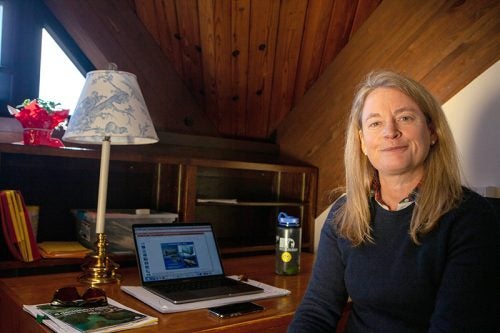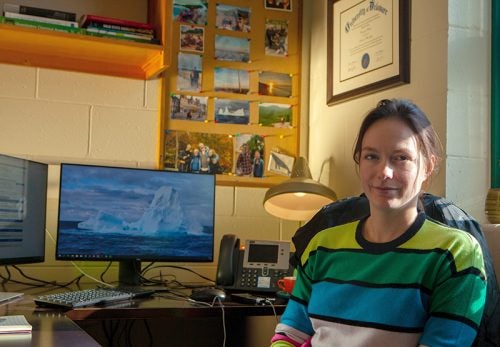By Todd McLeish
Martha McConnell
 Martha McConnell took an unusual route to becoming the first lecturer at GSO. The Connecticut native studied geology as an undergraduate, then served as a research assistant on projects that mapped the rocks beneath Antarctic ice before becoming an assistant scientist with the Sea Education Association.
Martha McConnell took an unusual route to becoming the first lecturer at GSO. The Connecticut native studied geology as an undergraduate, then served as a research assistant on projects that mapped the rocks beneath Antarctic ice before becoming an assistant scientist with the Sea Education Association.
After earning a doctorate in paleoceanography, she detoured into the world of marine policy as a NOAA Knauss Fellow working for New Jersey Senator Frank Lautenberg, where she authored the first bill about ocean acidification. She remained in Washington for six more years, serving as the polar program manager for the International Union for the Conservation of Nature and the National Academy of Sciences.
She returned to New England as a visiting faculty member at the U.S. Coast Guard and worked in private industry before joining the GSO faculty. “This opportunity is a great fit for me,” McConnell said. “I’m excited to use my range of experiences to teach topics from a variety of different perspectives.”
She is teaching an undergraduate class in coastal resilience this fall as part of the university’s Grand Challenges program, and she anticipates teaching other Grand Challenges courses in the future, as well as some graduate oceanography classes.
“I love when students really connect with a topic, but it’s also a challenge to help them connect,” she said. “There’s a lot of variety in my coastal resilience class, which is helpful as I try to reach the students from various majors and all class years. “As much as I love teaching, I also love mentoring,” McConnell added. “I’ve had amazing mentors in my life, so I hope to eventually take on a mentoring role on campus as well. That’s another place where I think I can serve the campus community.”
Veronique Oldham

When Vero Oldham first enrolled in college, she was sure she was going to become a medical doctor, but she quickly discovered a love of chemistry instead—especially when she realized she could study it outside. “That sounded like the most fun possibility,” said the Graduate School of Oceanography’s newest assistant professor. “The ocean is a great place to learn about chemistry.”
A native of Ontario, Oldham spent a summer working at the Bermuda Institute of Ocean Science after earning her bachelor’s degree, then studied trace metal chemistry at the University of Delaware for her doctorate in oceanography. She analyzed mineral-microbe interactions as a postdoc at Woods Hole Oceanographic Institution.
Now her interest is in how elements cycle in the ocean. “I focus on how fast reactions happen, where they happen and under what conditions,” she said. “I’m especially interested in looking at small-scale, nitty-gritty reactions and applying them to larger scale problems and questions.”
Next summer, for instance, she travels to the Baltic Sea as the manganese expert on a research team studying the chemical reactions taking place at the interface of waters that are devoid of oxygen at the bot-tom but contain oxygen at the surface. It is a critically import-ant subject to understand, since climate models are predicting widespread deoxidization in many water bodies.
Oldham is also beginning a project to fabricate micro-electrodes that can be used to profile elements in sediments or the water column. She plans to build them in her lab and deploy them in a variety of systems, from Narragansett Bay to hydrothermal vents.
“The Baltic project is an extension of what I’ve already been doing; it’s my bread and butter,” she said. “But this new project is something I haven’t done before. It’s my exciting foray into something new.”
